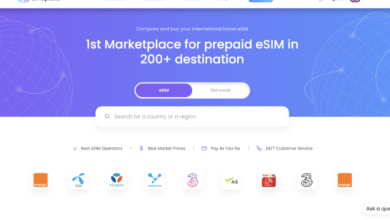
[ad_1]
05 May Using a VPN While Traveling: What You Need to Know
They’re out there. Watching and waiting, like a panther in the tall grass. As you kill time in the airport coffee shop, they look no different than your fellow travellers. But unlike you, they aren’t jetting off to Miami for a weekend of fun.
Nope – that dude three tables over, coolly sipping an iced frappuccino, is a professional hacker. Rather than travelling, they’re there to steal information from unwitting travellers – like you.
Unlike your home connection, airport public WiFi is open to all. When using these services, your data flies through the air unencrypted, allowing anyone tech-savvy enough to capture it.
So as you prepay for in-flight food with your credit card, our hacker friend is capturing your payment info. To avoid this scenario, you need a VPN. In this article, we’ll tell you everything you need to know about VPNs, and how to use them.
What is a VPN?
The term VPN stands for Virtual Private Network, but that only makes it sound techier. What does a VPN actually do? In short, it creates an encrypted connection that will shield your data from malicious actors.
This way, when you log into your email or buy treats for your upcoming flight, you’re protected. Your VPN converts sensitive data like your passwords or payment info into random characters that are untranslatable. When it reaches the other end, your VPN decodes your data into a usable format.
You go about your business as usual while our Starbucks-loving hacker gets foiled – justice!
What Else Can a VPN Do?
VPNs rock at keeping your data safe. But that’s not the only reason why these tech tools are excellent for travellers. When you connect to a VPN, you assume the IP of the country where it is located. So when you visit a site, they assume you are in that place.
This fact affords you numerous advantages. For starters, airlines price their tickets differently for different nationalities. By pretending to be from a poorer country, you can often get better deals on flights.
Once abroad, you may run into geoblocking issues. For instance, Hulu won’t allow you to access their servers if you are in Thailand. But by logging into an American VPN server, you can watch all your favorite TV shows – no questions asked.
Lastly, some nations censor the internet. China is an extreme example, but Thailand, Russia, and even Turkey block sites we take for granted. With a VPN, you won’t have to worry about losing access to email, social media, and other web resources. Simply log into a VPN server in a free country, and you’ll be able to skirt around government firewalls.
How do I get a VPN?
Don’t wait until you are overseas to get a VPN, though. Nations with internet censorship (like China) actively block access to sites that offer VPN downloads for Windows or Apple devices. Because of this, it’s imperative to secure one before you begin your trip.
But take care to weighs the pros & cons of different VPNs. Some offer a diversity of connection points worldwide, while others prioritize network speed. Others succeed at defeating exceptionally tough defences, like Netflix or China’s Great Firewall.
Don’t buy the first VPN you find. Figure out your needs, then take a couple of hours to research options. Narrow them down, then choose the one that best fits your situation.
VPNs: A Necessary Tool in Today’s Digital, Internationalized World
You can ill afford a data breach (especially bank-related breaches) while you are travelling. By getting a VPN, you can stop coffee-swilling cybercriminals in their tracks AND watch The Office from Bali. Talk about a win-win!
[ad_2]
Source link






